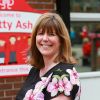
Roanne Clements-Bedson
- Course: MA Deaf Education
Please tell us a bit about yourself, where you are from, your background etc?
I am headteacher at a primary school in Liverpool, Knotty Ash Primary. The school has 250+ children, including 14 children with profound hearing loss. We are fortunate to have Liverpool’s only Deaf Resource Base in school, meaning that deaf children learn alongside their hearing peers. To enable full inclusion, every child in school learns British Sign Language from Nursery up to y6. The school is fully deaf aware and all staff have functional sign language skills. Specialist teachers of the Deaf and support staff provide specific support.
What made you want to apply to your course and to Leeds?
As head of this unique school, I felt it was crucial for me to have gone through the same programme of learning as our Teachers of the Deaf and to have a theoretical as well as practical understanding of the needs of our deaf learners. Although I have worked at Knotty Ash Primary for 16 years, I have only been head for two and am now responsible for its strategic leadership. It’s important that my understanding of deaf education matches my knowledge of mainstream education. At Knotty Ash, we believe that communication is a crucial skill for all our children, particularly for our deaf children, who often transfer to us with very little functional language. The Leeds course places a strong emphasis on language and communication, which seems to match our ethos as a school.
What is it that makes you passionate about your area of study?
I am passionate about providing the very best education possible to all our children, no matter what their background or ability. This course is an opportunity for me to explore the barriers that deaf children face and the range of strategies for overcoming them. We see deaf children whose self-esteem and identity needs nurturing, whose ability to form relationships has been impeded by lack of a common language with peers and who cannot hope to access academic education until they have a sense of self-worth and a language to receive information and to express their understanding. With specialist, individually-designed teaching and learning programmes in a fully inclusive environment, all children can flourish and achieve.
What do you think of your course so far – what aspects of the course have you enjoyed the most or are looking forward to the most?
The course is predominantly distance-learning, with some direct teaching in Leeds and regional tutorials to keep us on track. It is extremely well-organised, with each module clearly set-out and reading accessible through the online library. Our first module is Deafness and Development and is fascinating.
What would you say about the learning facilities in the School and at the University in general?
This isn’t really applicable to me but Minerva is great and very easy to use (and that’s high praise from someone whom technology left behind a long time ago!)
How do you find the student support in the School?
I’ve found there’s always someone helpful on the end of a phone when I’ve needed them.
What would you say to anyone thinking of applying to your course?
There is a lot of reading and you have to be self-motivated and have the organisational and time-management skills to be able to get through it independently. However, expectations for each module are clearly set out and reading materials are easily accessible. It’s been useful and thought-provoking already.
What do you plan to do once you’ve finished your course? What are you career aspirations?
I will continue to do what I already do – but do it better!

